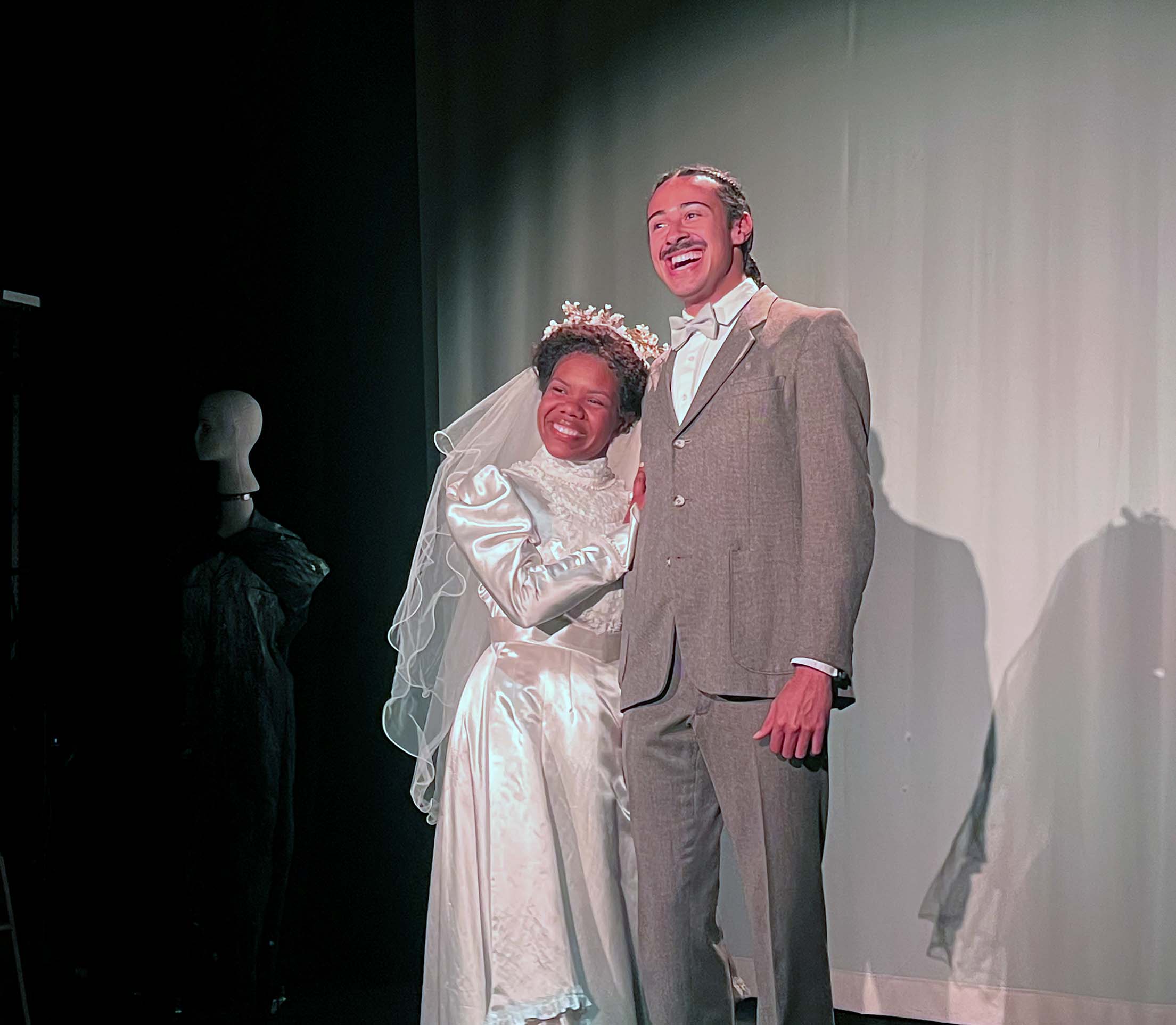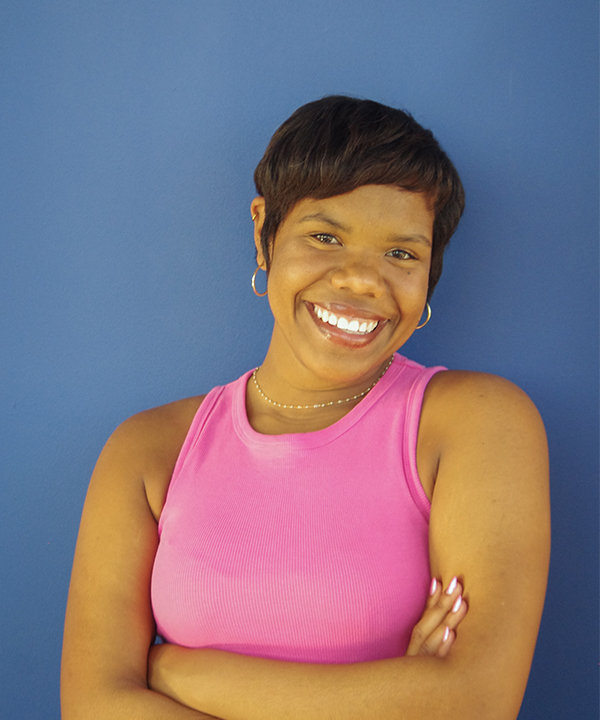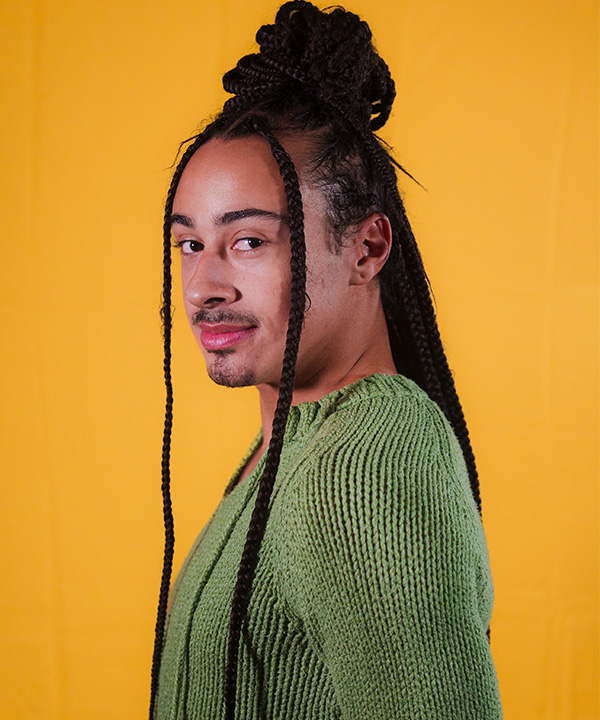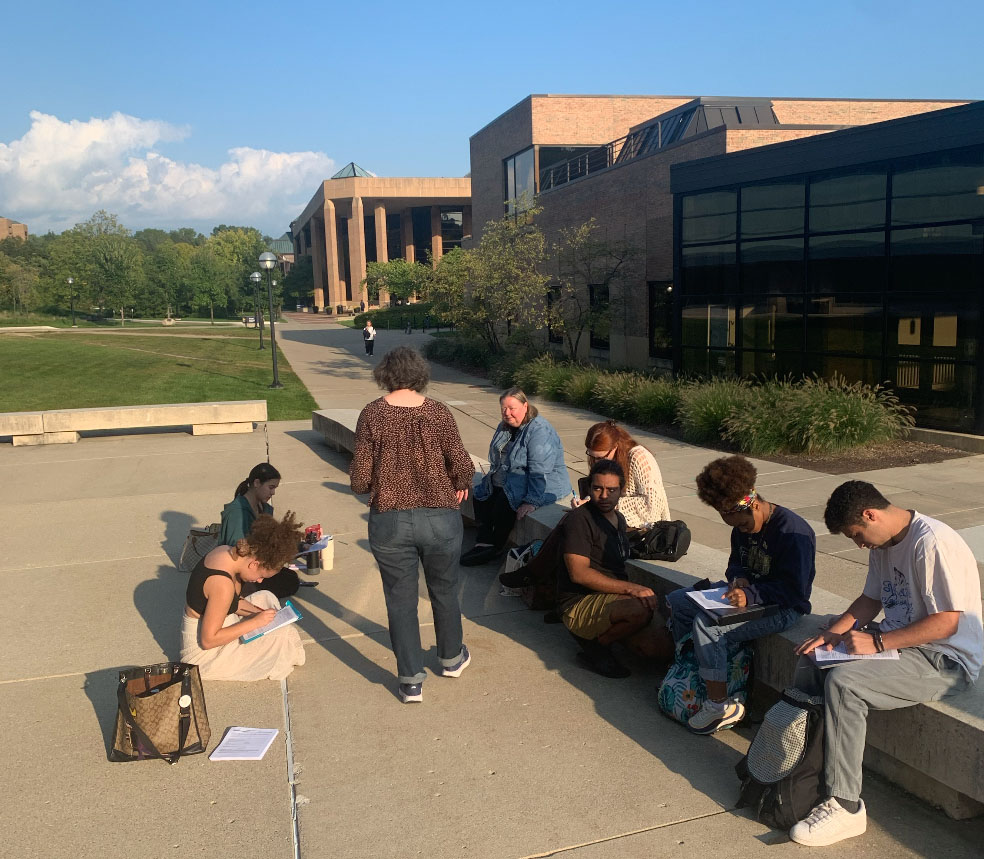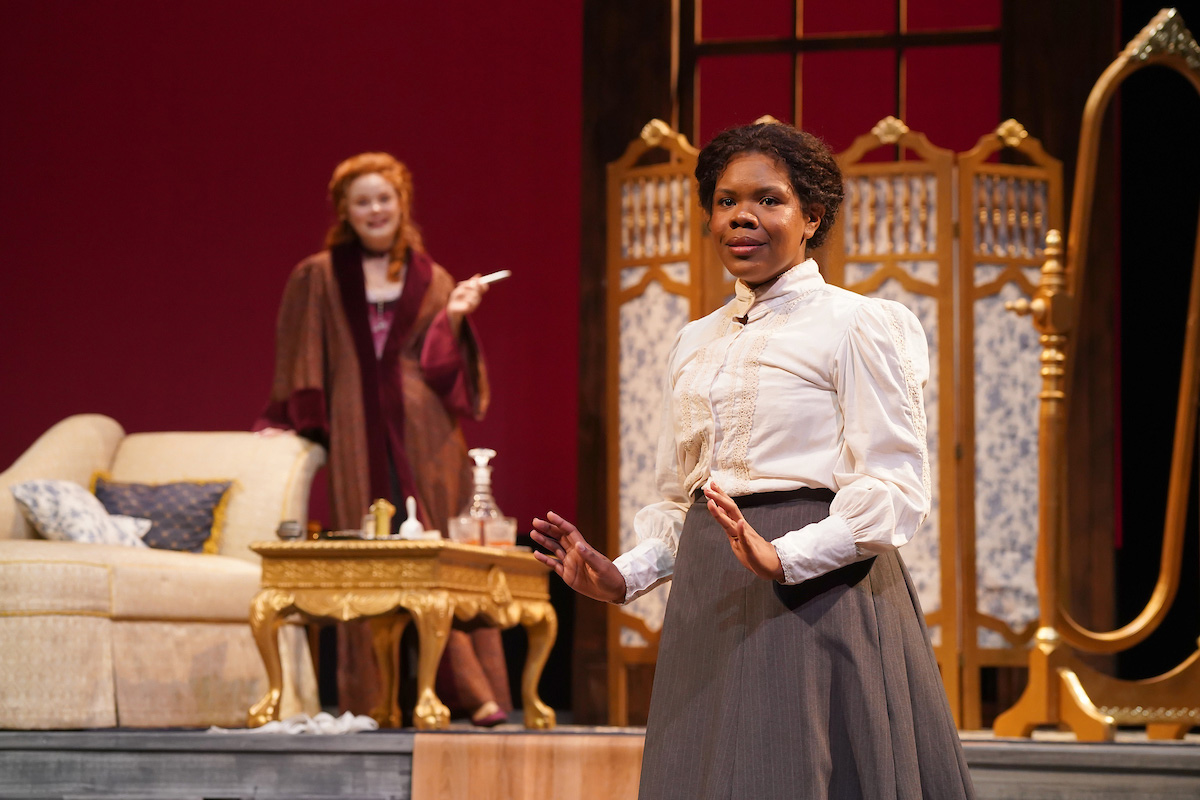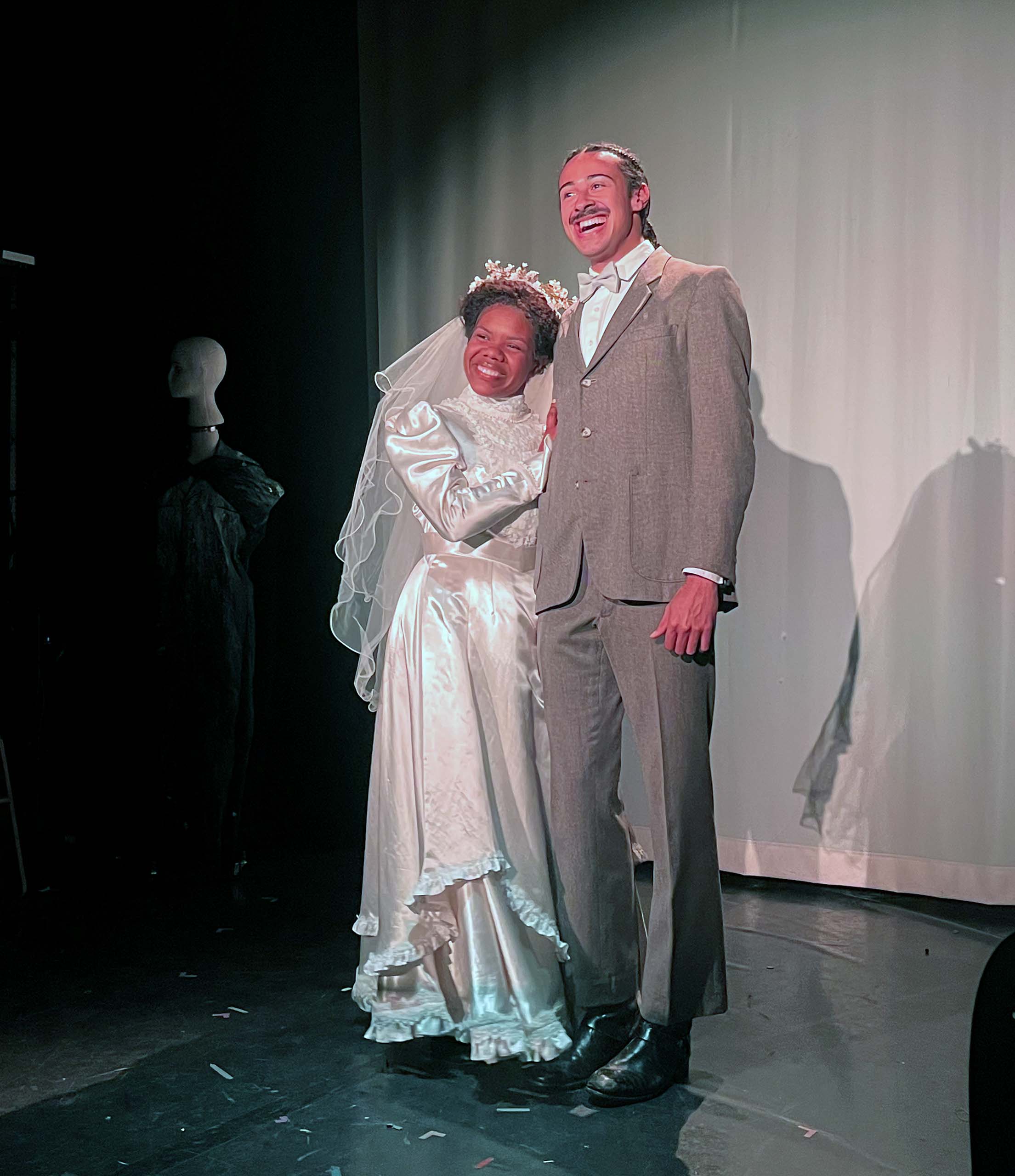The idea was to share Intimate Apparel, in some way, with the incarcerated community. The play centers on Esther, a Black seamstress trying to make her way in the world of early 20th-century New York City, and involves her correspondence and ill-fated relationship with George, a man working on the Panama Canal who dreams of coming to America.
When Ashley Lucas sought permission to perform the play in area prisons, Myles and Myah felt certain it would be denied. To their surprise, Lucas obtained permission for the students to perform the full play. In the weeks following the University Productions run in the Arthur Miller Theatre, the students got to work preparing for a set of vastly different performances. They ultimately gave five performances of Intimate Apparel in four Michigan prisons, with Myah in the role of Esther and Myles in the role of George. Below, Myles and Myah tell the story.
MYAH: I kind of stumbled upon PCAP when they were doing their art show in Pierpont [an annual event featuring works by artists from 25 Michigan prisons]. I sat in that auditorium, and I just cried the entire time, because I was so moved by all of the speakers. They had previously incarcerated participants come and talk about their art and what PCAP means to them. I emailed Ashley [Lucas] immediately and asked, Can I please take your class? “Theatre and Incarceration” changed my life. And now I’m very much stuck. I mean, the people inside have impacted my life in so many ways, so I’m here for life.
MYLES: Originally, when I was doing college auditions, one of my mentors said to me, You should really go to Michigan because they have the Prison Creative Arts Project. Fast forward to two years later, and Myah and I were taking “Theatre and Incarceration.” I worked in a men’s prison, Cotton Correctional, in Jackson, doing a workshop every Sunday afternoon with about five or six other acting and directing majors.
This semester Myah and I were in an independent study with Ashley Lucas. We were really changed by PCAP in the second semester of our sophomore year. One of the biggest things that you realize when doing PCAP is, when you end that first round of workshops [at the end of the winter semester], if you plan to continue to do PCAP, you have a whole four months to not see the people who you’ve developed kind of a family with. We got to live our summer lives, do internships, do shows, and really just be free – while they’re still inside these prisons, not getting to do art and not getting to be as exposed to the things that we were doing in workshops.
How did this idea come about, to perform Intimate Apparel in prisons?
MYLES: Myah and I [had talked a lot about how] it’d be so cool to bring theatre into prisons, and so I threw the idea out to Ashley. I said, Even if we could just do something around the idea of a theatre workshop revolving around the play, or just selected readings of the play, or we just talk about our experience doing it, that would be enough.
She said, I’ll see what I can do. It’s very, very hard for scripts and writings and material to get approved through prisons. This play deals with some very heavy concepts and a lot of intimate relationships, so we didn’t even know if this could get approved. But luckily it did.
So then Myah and I had a meeting with Karin [Waidley, lecturer and resident dramaturg], Judy [Judith Moreland, the guest director of Intimate Apparel], Ashley, and a few others, and we asked how we can make this happen. Judy was just so giving – she said, I won’t be here (because she works at UCLA) and I won’t get to see this, but I’ll give it over to your assistant director (Victoria Vourkoutiotis, a senior acting major). And so she passed the baton to Victoria, to then re-block the whole show and make sure that it’s possible to do in prisons. And, thankfully enough, Victoria was also doing PCAP workshops at the same time as we were, so she already understood the dialogues that we could be having, how to specifically work within a prison. So really, even though there was a lot of work that was done on everyone’s part, it shockingly came together quite easily.
MYAH: I will never forget getting that email from Ashley: “They’re letting us do it.” Just from all that we had learned that semester about prison, all that we had experienced firsthand, all that we had heard from the people in our workshops – about how they barely have access to books in their library about Black people, and the majority of people in prison are Black. So the fact that this predominantly Black story was getting allowed into prison in its full form, I just thought, Whoa. I had talked to the women [at Women’s Huron Valley] so much when I was going through the audition process of Intimate Apparel, because I wanted it so badly. I loved the show so much, and I’ve always wanted to play the role of Esther. So when I told them I got it, they were like, Oh, my gosh! When I was able to come back to our first workshop in September and say, Hey, we’re bringing the show to you, live, they didn’t believe me. And I told them, Girls, November 18th. We’re here. And it was just so beautiful. Things like this are unheard of.
How did you prepare for these performances? Were you able to wear your costumes or bring in any scenery or props?
MYAH: We didn’t have a set. We emailed the prison and asked for at least a piano, so that is one thing that we did have from our set. They had a piano because they do church, and music for church is very important. And then we would just use whatever chairs they provided to make a makeshift space for us to move around in. We had almost all of our props except the money, because you are not allowed to bring anything that resembles money into prison, or cigarettes. So they provided us with cut-up pieces of green card stock, and that was our money. In terms of costumes, all of the girls had our corsets, and we all had one skirt to wear, so no costume changes. And we all had our button-up shirts as well. There’s a part where I reveal the corset, and I was able to do that, which was also shocking. To be able to take off a piece of clothing in prison is unheard of.
I remember Ms. Butler, who’s the programs manager at Women’s Huron Valley, after she saw the show, she said, “If you would’ve told me exactly what happened in this play before you performed it, I wouldn’t have let it happen, but I loved it.” She watched the whole thing through, and then I saw her the week after, at the final performance for my workshop, and she asked when we were coming back. She was so excited to have us back.
MYLES: What was also interesting is, at the University of Michigan, it was performed in this beautiful theatre with a thrust stage. Everyone can see it from three sides. In the prisons, we were mainly performing in gyms or these very big spaces, which is very crazy to be doing theatre in. This story works within the confines of a smaller space. To be doing this in a gym, we had to adapt on the spot. There was one show that we did at Cotton Correctional where, about 10 minutes into the performance, they could not hear us, because we were just echoing so loud. There were about 90 men watching the show, and none of them could hear. So they gave us mics. And then we had to do the whole show with them in hand. Mind you, this is a very physical show; Myah had to tie up corsets with a mic in hand and still try to say her lines into the mic at the same time.
Every single prison we went into, we had to adapt, and the story was still able to connect and make sense. The space didn’t take away from the story itself, because the story is so rich and so moving. You’re able to just follow through so clearly with Lynn Nottage’s text. This was the other big part that Victoria really helped us with in terms of assistant directing, because her approach was, Let’s just figure this out. How can we make this work? And Ashley was with us for every single performance, holding our hands, making sure that we were okay.
MYAH: I have to shout out to our cast, because a lot of them had never experienced PCAP, and they really just jumped into it. And now they’re all taking “Theatre and Incarceration” this semester, so it’s kind of spread throughout the cast. [Initially] Myles and I came [to them], and we said, Hey, guys, we’re going to prison. Are you coming, or not? And everybody said, Yeah, let’s do it. Everybody just dove in and dealt with everything that was thrown at us.
How did the audiences react to the performances?
MYLES: At Women’s Huron Valley, I don’t think we’ve ever had that much audience participation in terms of talking back. They’d be screaming, like, “No, George, don’t do it!” It became a conversation, versus when we did it in the Arthur Miller Theatre, everyone was silent. I think there was something so beautiful about doing this story with a dialogue during the show. The play did change so much based on what we were doing within those prisons, just because of the sheer amount of vocal energy. There was a moment where Myah and I were on stage, doing one of the final scenes with George and Esther, and it became a screaming match between us two, as well as the audience – to the point where we literally had to stop and look at each other and just start laughing.
MYAH: The [“Theatre and Incarceration”] class really showed me where theatre is supposed to be, and it’s supposed to be in places like that, where people aren’t allowed to fully be human. They need to watch people fully be human in order to heal, because that’s one thing that prison does not do, it does not heal. A lot of prisons claim, Oh, look! Rehabilitation is our mission! No, actually, not at all. People are broken down completely. Their cultural capital is gone. When we performed, all the people watching were immediately saying things back, sometimes responding to a line before another character could, but saying the line that character was about to say. It just showed how much the story resonated with them and how they were on the edge of their seats, like on the edge of every word that we were saying, because this is something that they never see. Most of the men raised their hands, admitting this was their first time ever seeing a show, ever seeing theatre, and saying, I wanna do it now. And it was just the most beautiful thing. During the talkbacks [post-show Q&A sessions] at the men’s prison, so many of them said to the women in the cast, You remind me of my daughter, never give up. Such motivational things in a place that has no hope. They had so much hope for our future and such care.
They’re not even called by their names. They’re called by numbers. And so to have us come and perform for them and speak to something that a lot of them [have dealt with] – especially Esther, who deals with emotional and domestic abuse. Half the women in prison are there because of their significant other. So to sit in front of a group of women and tell this story was magical, actually magical. So many of them said that it changed their lives, and it changed ours as well.
What was the impact of these performances on you?
MYLES: It was educational: everyone is learning. It becomes not just a piece of theatre that’s being seen; it becomes an educational space about our own inner emotions and what we do to get what we want. Even though this is a theatrical piece, I think this was a moment where we got to explore, How do we work as these people in society? And how come sometimes certain societies will deem us as unfit to be working in these spaces? I think it’s really just a testament to what we were getting to do, being a predominantly Black cast in a prison like that, and getting to see how everyone was reacting.
I had a particular moment when we were at Thumb [Correctional Facility], and we weren’t informed of this, but as soon as we were about to start a show, these 10 boys came in who were in the juvenile facility. Myah and I just lost it. These boys are about 13 to 16 years old, and yet they are in prison. It’s just so heartbreaking to see it in real life. I mean, it’s heartbreaking regardless. But when you see them walk in and they sit down, and they have to be in their own section, they can’t talk to the men, it’s so separate…
We have the luxury of getting an education, of doing theatre, of telling stories. If we get this chance, how can we not use it to better our society? As Myah was saying, theatre is meant to be done in prison, and it’s meant to change people’s lives.
There are those moments where you just think, How can I use my art? And how can I use this degree? Myah wants to do education. I’m very into social justice work. We want to try to make sure that theatre isn’t just meant to be capitalistic and performative, meant for just enjoyment and for this idea of, Oh, I can have a night on the town and see a piece of theatre, and then not think about it when I leave! We wanted to do something that was not just theatrical in its use, but something that actually makes people think about their lives and think about the way that they work and exist in the world. So that’s why I want to be an actor. That’s why I want to tell stories. And that’s why I think it is so important to be getting a degree at the University of Michigan and studying acting and figuring out what the things are that we can do to actually change our world, versus just putting on this facade, or wanting to be famous, wanting to be seen, wanting to get an Oscar. I think there’s just so much more to it.
Ashley Lucas and PCAP were the ones who fully brought that into us, and I think their work has started to trickle down into the Department of Theatre & Drama. We’re really hoping that this can be a constant, and that the work that we’re doing within this program can honestly be something that’s required. We should make “Theatre and Incarceration” a requirement. It needs to be something that everyone knows about.
MYAH: I think this project came at such a perfect time. Most of the cast are juniors and a few are seniors, too. We go through life in SMTD, which is such a position of privilege. We’re one of the top programs for everything to do with music, theatre, and dance. And I was getting so caught up in the mentality of, Oh, my gosh! I have showcase next year, and I need to get an agent. I need to make money. And then we got to go into prison and perform there, and everything made sense. The entire university needs to understand that there is so much more in this world than our little bubble of Ann Arbor, which is such a privilege. This project showed that. I just wish everybody could see this, and how it can impact lives on both ends.
Toward the end of our tour, [when] I was in prison two or three times a week, I started having dreams of being in prison. Myles and I had a conversation, and we thought, How does Ashley do this? How does she give so much to not only people inside, but to all of her students, while experiencing things like this every single week? We’re getting super emotional, but she just has this beautiful balance of being able to give so much. She’s always at 100. And so I asked her, How do you do this? And she was like, “When you want to do something, you’re going to find a way.” She’s just such an amazing person. And what she’s built here is unmatched. There’s nothing like it anywhere.
What do you think it means to incarcerated people to see a performance like this?
MYAH: I am speechless, because I don’t think we would ever know. We will never, ever know what they’ve been through. So many of them told us, You saved my life. They live the same life every single day. Who wants to be confined to a room smaller than a bathroom, some people for their entire lives? Some people have grown up in prison. It’s impacted them in ways we will never be able to comprehend.
If anything, we brought joy, which Ashley always says is the biggest form of contraband in prison. We brought a lot of community-building for the people inside. They’re often pitted against each other, whether that be by guards or just by the social dynamic that exists within prison. To just sit in the space with men, women, all different genders, all different races, and to have them laugh together and cry together and make comments together. I would sometimes look at the guards to just see what they were thinking, and they were laughing – which, if you’ve been into prison, they don’t move. To have them joke around with the people who are incarcerated? Unheard of. To see guards interacting with the men afterwards, and asking them how they liked it, I was like, Wow! Look at all the walls we just broke down.
MYLES: We did have support from the Department of Theatre & Drama and the big, big support system from Ashley and PCAP. But this was mainly all student work, in collaboration with Ashley. A lot of it we had to do on our own. It’s not a given, and it’s not just a thing that can be taken for granted. It’s something that you have to work for. And it’s something that you need to fight for. This was voluntary. This was not for credit.
MYAH: Yeah, we lost our entire technical team and stage management. It was just the cast and Victoria, because we have to take in the smallest number of people we can, or else we’ll be at the prison gate for hours. So we really did it all ourselves; we all became the stage managers, we all became the costumers. It was just such commitment from every single party involved. All because we were passionate, and we wanted to do it. None of us got anything out of it. I mean, we got a lot out of it, but nothing tangible. We didn’t get a certificate at the end, like, Thank you for all of your work. You did this, wear this medal. But we don’t need that at all. It’s just all the emotional fulfillment that came with it.

